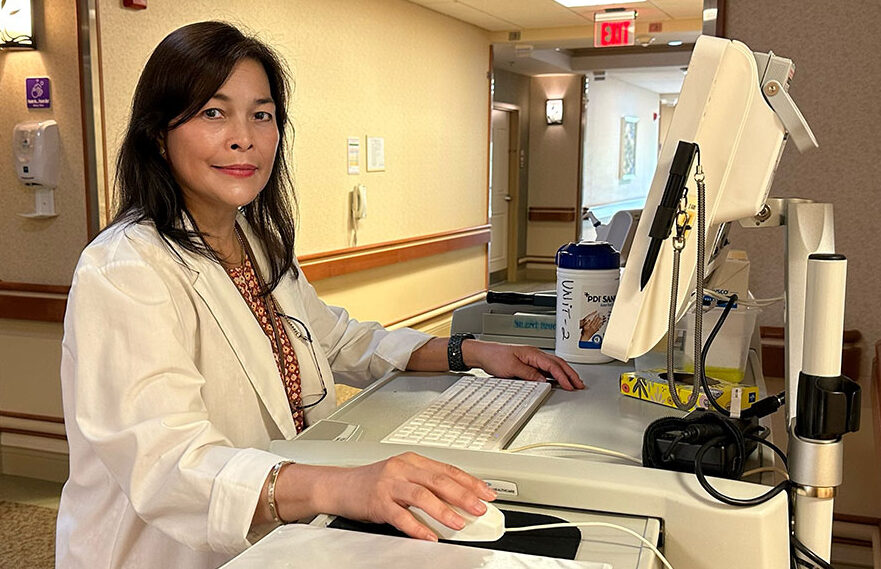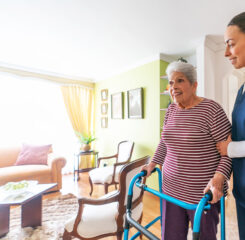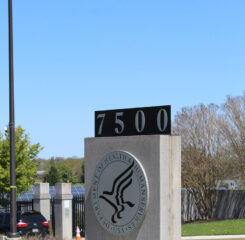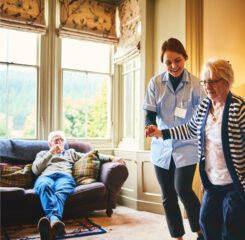Lourisa “Lulu” Solomon, RN, will receive the 2024 Joan Anne McHugh Award for Excellence in Frontline Nurse Supervision at the LeadingAge Annual Meeting in Nashville, October 27-30. This year’s award recognizes the critical role that frontline nurse supervisors play in the long-term services and supports (LTSS) workplace.
For the past four years, Solomon has worked as a staff development coordinator, infection preventionist, and supervisor at New Jersey Eastern Star Rehabilitation and Nursing in Bridgewater, NJ. In that multifaceted role, she implements training programs for direct care professionals, mentors and guides those caregivers through their professional development, and leads the infection control response. She also supervises 45 care team members while providing hands-on nursing care to 70 residents.
A native of the Philippines, Solomon pursued a career in health care so she could follow in the footsteps of her mother, a midwife, and her aunt, a nurse. She worked briefly in acute care and began her long career in aging services after moving to the United States in 1985.
“I had only a few months’ experience in acute care,” recalls Solomon. “In long-term care, we develop long-lasting relationships with patients and colleagues. So, that’s why I stayed in long-term care.”
Solomon’s approach to nurse leadership is refreshingly straightforward.
“I have always believed that true leadership is not about being in charge, but about taking care of those in your charge,” she says. “Nursing is such a miracle profession, but the work that we do is tough. When we care, serve, and help others, we often feel unrecognized, and the strain can lead to burnout. So, I spend time listening to (my team), keeping my door open, and making sure I deliver what I promise.”
Over the past four years, that approach has been indispensable in helping Solomon launch successful initiatives to train team members, promote workplace diversity, and prevent COVID-related deaths.
Training and Coaching
Solomon created a peer mentoring program—which pairs experienced nurses with new hires for their first 90 days—that significantly reduced turnover rates, according to Director of Nursing Agustin Guido III.
“When we hire new nurses, I want to empower the new nurses,” Solomon explains. “I want to develop their potential, not only in caring for residents but in their own professional growth. Our training is informal, but it is continuous.”
Much of that training comes at the bedside, and much of it is led by Solomon. She is known for addressing stressful situations, from agitated residents to broken water pipes, by calmly demonstrating the best response and then teaching team members practical strategies they can employ when a similar situation occurs. Solomon couples this approach with weekly skills workshops on wound care and infection control that have helped reduce resident infections by 20%.
A 90% retention rate has allowed Solomon to work with the same team of nurses for the past four years. She’s proud to have encouraged many team members to advance in their careers, including several licensed practical nurses who returned to school to become registered nurses.
Promoting Diversity
Solomon’s work to promote workforce diversity resulted in a 15% increase in staff retention. That work includes implementing cultural competency training programs, organizing cultural celebration days and an Annual Education Fair focusing on diversity topics, and facilitating diversity and inclusion panels where staff can voice concerns.
Controlling Infection
Team members still appreciate Solomon’s actions during the pandemic, which helped prevent COVID-related deaths and led to a series of deficiency-free infection control surveys. Working with the organization’s administrator and director of nursing, Solomon implemented the Clean Hands and Shoes Environment-Total Infection Management Engagement (CHASE-TIME) initiative, which controlled virus spread by requiring staff to disinfect their hands and shoes when entering and exiting COVID isolation areas.
“It is no understatement to say that Lulu’s actions during the pandemic saved us all,” says Certified Nursing Assistant Lyn Avergonzado. “Lulu is a big part of why we all feel safe at work to this day.”
While proud of the COVID-19 successes, Solomon gives credit to her team.
“No one died, thank God, but it was not only me,” she says with characteristic humility. “I drive the car toward that goal, but the staff members do it. They are on the floor all the time. They are the ones taking care of residents. I’m just reminding them to do this or that.”
Keys to Success
Solomon has developed a keen understanding of what it takes to be an effective nurse leader. She says it comes down to compassion and empathy.
“Nurse leaders have to care,” says Solomon. “They have to be compassionate. They have to learn how to communicate and, of course, be consistent with their mentorship. You have to be visible all the time. You have to respect [team members] because if you don’t respect them, they will not respect you.”
“My team doesn’t have to walk on eggshells around me,” she adds. “I try to put myself in their shoes. I’ve been there, I’ve been on the floor, I’ve been a staff nurse, so I know what it’s like.”

 Shutdown Week Three: Impact of Ongoing Closure on Affordable Housing
Shutdown Week Three: Impact of Ongoing Closure on Affordable Housing RHT Program Awards: All 50 States To Receive Funds, Says CMS
RHT Program Awards: All 50 States To Receive Funds, Says CMS CMS Publishes Draft OASIS-E2 Guidance Manual
CMS Publishes Draft OASIS-E2 Guidance Manual CMS Debuts Models: ACCESS, ELEVATE and LEAD
CMS Debuts Models: ACCESS, ELEVATE and LEAD


